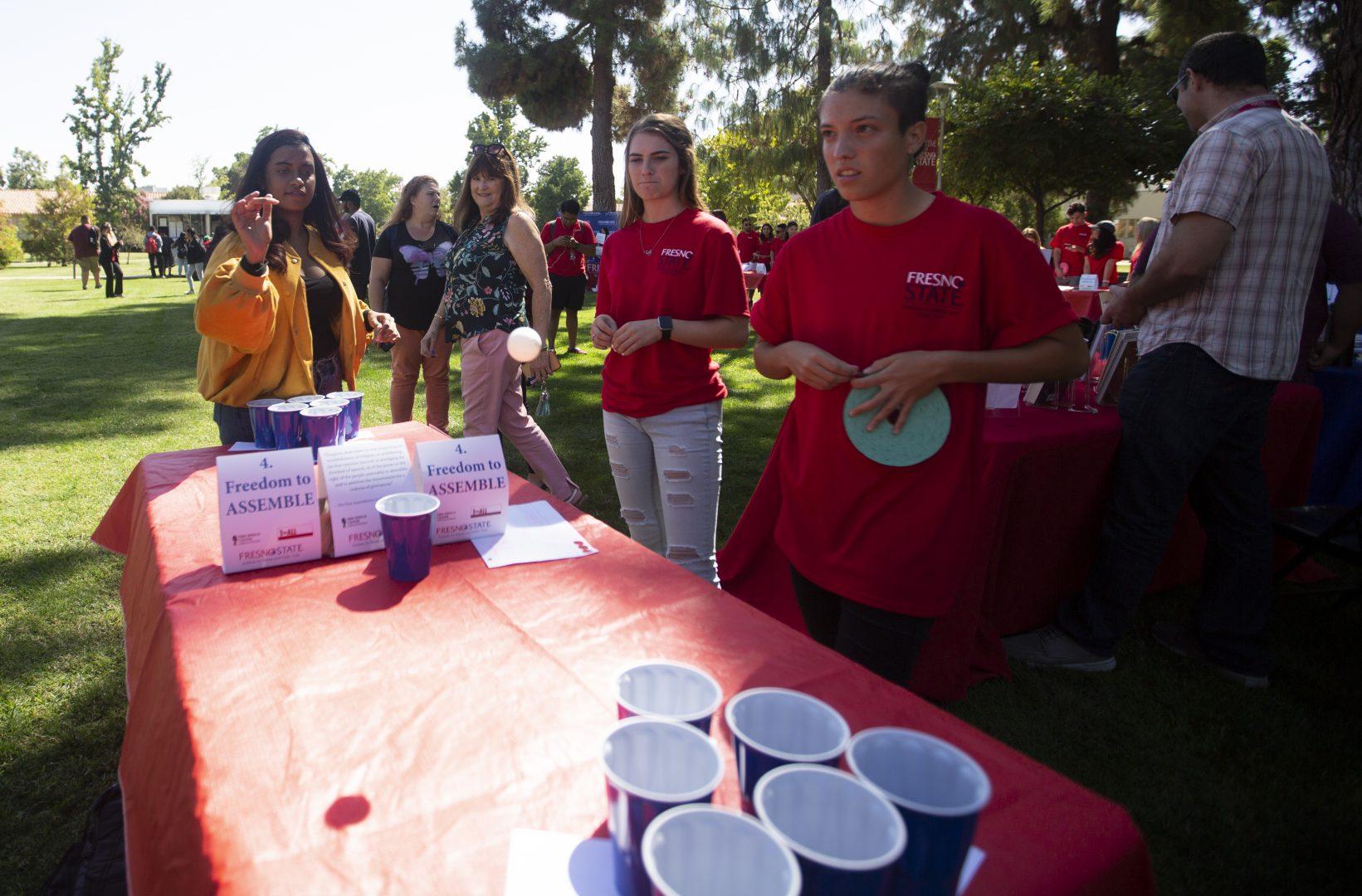Fresno State celebrated Constitution Day on Tuesday with a rundown of the First Amendment, a history of the 19th Amendment and discussions about the 14th Amendment and its impact on race dialogue.
Constitution Day was established by Congress, which passed an act after 9/11 to raise students’ awareness of what is included in the Constitution and the rights it provides citizens. This was done in response to the call for restrictions on rights, specifically religion, after 9/11.
Dr. Andrew Fiala, director or the Ethics Center and professor of philosophy, said, “We are just trying to get people thinking about our democracy and how we can do it better. If we are going to make a better democracy, we need to have the education, and this needs to be education on everything. Understanding the system is helpful, and we need to get our students engaged.”
At Fresno State, Constitution Day was put on by the Ethics Center at Fresno State, the Political Science Department and the Institute for Media and Public Trust. In the past, each entity has had separate events and activities on different days, but this year marked the first time these entities hosted Constitution Day in conjunction with one another.
The political science department focused on the 19th Amendment, because this year is the 100 anniversary of the ratification of the amendment. The department had three speakers, Dr. Lisa Bryant, Dr. Natalia Kasianenko and Associated Students, Inc. Vice President of External Affairs Elizabeth Rocha Zuniga.
Bryant presented on the women’s suffrage movement in the United States. She highlighted the key influencers of the movement, while also vocalizing the separtatist movement that formed due to racism and classism. When women obtained the right to vote, according to Bryant, they were slow to go to the ballot box, but have since voted at higher rates than men.
“One of my goals was to highlight that women’s participation and women’s right to vote has always, sort of, intrinsically tied to social justice issues,” Bryant said. “Even if it wasn’t completely inclusive, that underlying idea of social justice has always been part of women’s participation.”
To compare the efforts of women’s suffrage on an international scale, Kasianenko spoke about the women’s movement in the Soviet Union. Contrasting the long battle of American women to win the right to vote, women in the Soviet Union won this right with little confrontation.
Soviet women were able to accomplish suffrage in 1917, two years before the U.S. obtained suffrage ratification in 1919. Despite the ease of obtaining suffrage, Russian women had, and continue to have, little power within the political system.
“The biggest idea was that even though women might have the right to vote, it doesn’t necessarily mean that they will have actual political rights and their voice will actually make a difference,” said Kasianenko. “Like with the Soviet Union, women had the right to vote, but there was no democracy.”
Rocha Zuniga concluded the panel presentations with the importance of voting, especially for young populations like those in attendance at Fresno State. She also shared her progress on Assembly Bill 963, which would require all state campuses to share election related information with students and is currently waiting for a vote in the California State Senate.
“This was an important event for me because I want students to know that I really care about student engagement, and I want to increase the awareness of what is going on in the state,” Rocha Zuniga said.
The panelists encouraged audience members to make use of their right to vote and to participate in the political system in whatever way they can.
Viviana Montes, a student of Kasianenko, seemed to be especially receptive to this message.
“I feel more empowered to vote now and I want to look into the current political candidates and what they’re running for,” Montes said. “I will for sure be voting in the next election.”
Besides the 19th Amendment, the day also highlighted the First and 14th Amendments. The Institute for Media and Public Trust led the charge on the First Amendment. It set up tables dedicated to the separate protections the First Amendment entails. Each table represented a different right and taught students more about the freedoms within this amendment.
The Ethics Center focused on the 14th Amendment, celebrating its 150 year ratification anniversary, by holding discussions on the protections of the amendment from an attorney’s point of view and discussions on race. This event also featured a video on the history of civics and race.




